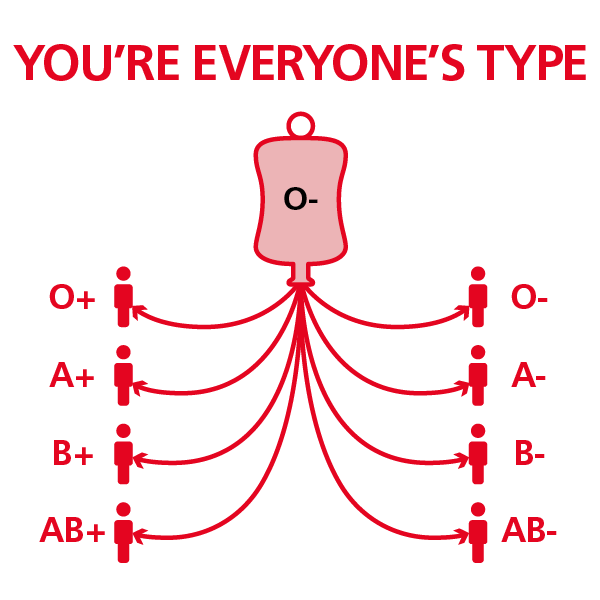What makes O negative universal?
O negative donors are often said to be ‘universal’, meaning that their blood can be given to anyone safely in an emergency. That’s why air ambulances carry it on board.
O negative blood donations are always needed. Although about 8% of the UK population has O negative blood, it accounts for around 13% of hospital requests for red blood cells.
To understand why the O negative blood type is universal, we'll take a closer look at blood group systems, antigens and antibodies.
Understanding blood type
Your blood type is inherited from genes passed on by your parents. The two most important ways to determine your blood type are the ABO and Rh blood group systems. The ABO system gives us the letter part of your blood group and Rh system gives the positive or negative part.
Which group you belong to depends on the antigens and antibodies in your blood.
Antigens are a combination of sugars and proteins that coat the surface of a red blood cell. Individuals with blood type A have A antigens, while those with blood type B have B antigens. People with the AB blood type have both A and B antigens, and those with blood type O have neither.
Antibodies are found in plasma, the liquid part of the blood that carries platelets, red blood cells and white blood cells around the body. Antibodies are the body's natural defence system. They recognise anything unfamiliar within your body, including 'foreign' antigens from other blood types, and tell your immune system to destroy them.
For instance, people with:
- Blood group A produce antibodies against B antigens.
- Blood group B produce antibodies against A antigens.
- Blood group O produce antibodies against both A and B antigens
- Blood group AB produce neither.
O group blood can be given to almost anyone because you don't have A or B antigens on your red blood cells, so they will not be attacked by the antibodies of someone receiving a transfusion.
The D antigen in the Rh system determines whether you have positive or negative blood. If you have the Rh D antigen, your blood type is positive. If you lack the Rh D antigen, your blood type is negative.
When a blood donation is given to someone who needs it, known as transfusion, we need to consider how antigens and antibodies interact with each other.
The presence of antigens on the donated red blood cells is important. A bag of red blood cells has most of the plasma – and therefore antibodies – removed, but still contains antigens.
 If someone has antibodies for certain antigen and they receive a blood transfusion containing that antigen, then their antibodies will attack those 'foreign' blood cells and break them down. Due to this severe immune reaction, they would very quickly feel unwell and would need immediate treatment to prevent kidney failure and low blood pressure.
If someone has antibodies for certain antigen and they receive a blood transfusion containing that antigen, then their antibodies will attack those 'foreign' blood cells and break them down. Due to this severe immune reaction, they would very quickly feel unwell and would need immediate treatment to prevent kidney failure and low blood pressure.
O negative red blood cells have no A or B antigens and no Rh D antigen. O negative blood donors are universal because there's nothing in their blood for a patient's antibodies to 'attack'. Without the antigens to trigger the patient's immune system, O negative blood is safe to give to anyone regardless of their blood type.
Maintaining a supply of O negative blood is a constant challenge, and we always need your donations.


